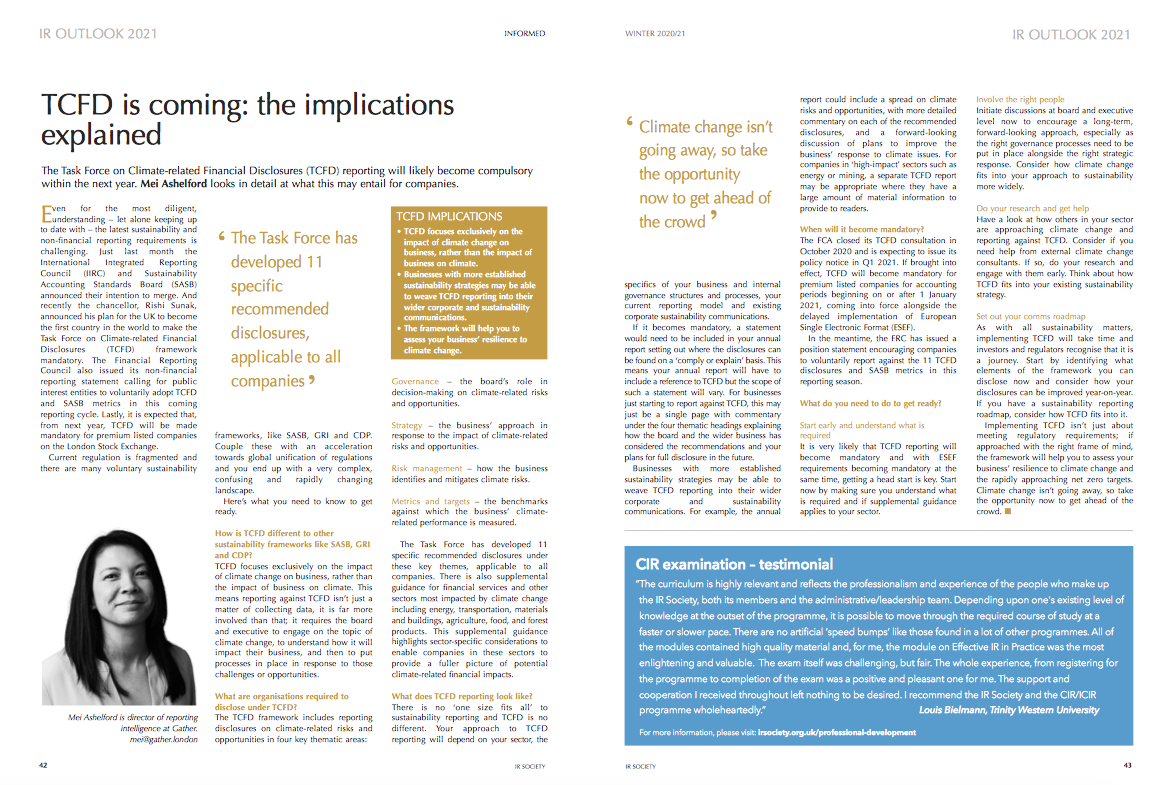General
Climate-related reporting: the key trends of 2020

In a December 2020 policy statement, the Financial Conduct Authority (FCA) announced the implementation of mandatory disclosures consistent with the Task Force for Climate-related Financial Disclosures (TCFD) recommendations for premium-listed UK commercial companies.
Research in September 2020 from EcoAct, an international climate consultancy, reviewed the climate-related reporting of the FTSE 100, highlighting the top reporters and the major trends among them. Scored against 64 environmental sustainability criteria, the ‘top 10’ climate-related reporters are:
-
- Unilever
- BT
- Landsec
- Coca-Cola HBC
- SSE
- NatWest
- British Land
- Barclays
- Aviva
- BHP Group
EcoAct’s research identifies 4 climate-related reporting trends from 2020:
TCFD disclosures
The assessment of climate risks and opportunities is unsurprisingly at the top of the list of trends, with a 19% rise in FTSE 100 companies aligning their reporting to TCFD. Given the FCA have now introduced TCFD as a mandatory requirement, with plans to extend its scope, it’s a safe bet that this year the best reporters will be working on achieving full compliance with the 11 specific TCFD disclosures.
For guidance on implementing TCFD in your reporting, please request the article written by our Director of reporting intelligence, Mei Ashelford, in the Winter 2020/21 issue of the IR Society’s Informed magazine. The article explains the current outlook for TCFD reporting and discusses the implications and steps which need to be taken.

Science-based targets
Another notable trend is a rise in the setting of science-based targets (SBTs), with 57 FTSE 100 companies now having set or committed to setting an SBT. A long-term, goal-oriented approach is a staple of effective sustainability reporting, and a more demanding, consistent methodology for setting these goals is key to weeding out ‘greenwashing’. Measuring climate progress against SBTs was highlighted in the FRC’s ‘Investors’ climate thematic review as an aspect of climate-related reporting increasingly requested in shareholder resolutions, so expect to see their adoption continue to grow among listed companies.
Renewables
The use of renewable energy sources continues to receive attention after 2020 became the UK’s ‘greenest year on record’, with the use of coal in the power grid sharply declining. An increasing number of companies are fuelling this trend -91% across the FTSE 100 are now implementing energy-efficient technology into their businesses. The most ambitious companies are now outlining their plans to move to 100% renewable electricity, with some committing to global renewable electricity initiatives such as RE100.
Scope 3 emissions
Reporting of Scope 3 emissions (indirect carbon emissions that occur in a company’s value chain) has seen increased adoption, with 75% of FTSE 100 companies now disclosing at least some of their Scope 3 emissions footprint. Reporting on Scope 3 is not currently mandatory for listed companies, but wider Scope 3 disclosure is encouraged by TCFD and many investors. While it’s possible Scope 3 disclosures may become mandatory in the future, in the short-term we can expect the best environmental reporters to broaden their reporting in this area voluntarily.
What should you be doing in 2021?
The trends described in this article are being implemented by experienced reporters who are well advanced into comprehensive sustainability strategies. Not all companies are as far into their sustainability journeys, but these trends give an insight into what stakeholders are looking for across all levels of sustainability reporting, i.e. transparency. Everyone wants to see ambitious targets, but be honest about your progress towards them, and what needs to be done to get there.
Comprehensive sustainability reporting doesn’t spring up overnight. Establishing the right processes now not only shows your stakeholders that you are committed to sustainability across the business, it also builds the foundations to respond as these trends accelerate and more appear on the horizon.
Read the EcoAct research.
Read our update on the FCA’s TCFD policy statement.
If you need support or guidance with TCFD, or any aspect of your annual or sustainability reporting, please get in touch with will@gather.london.